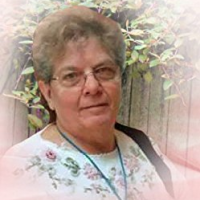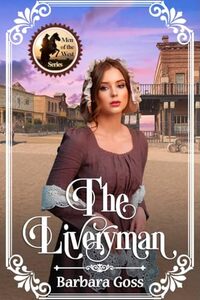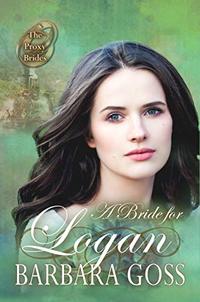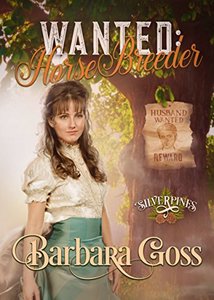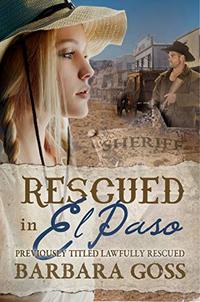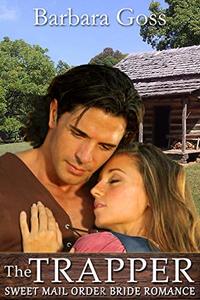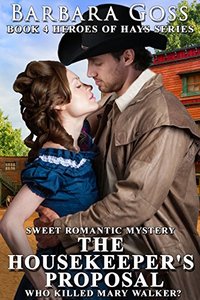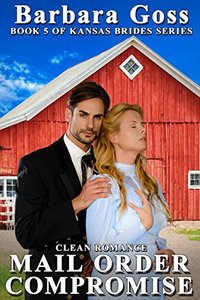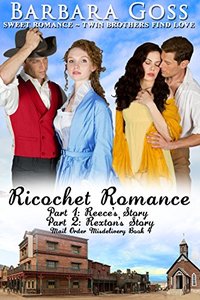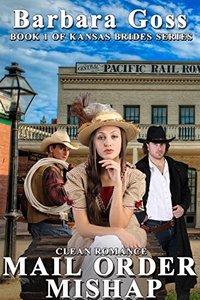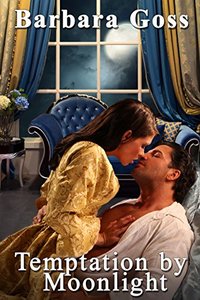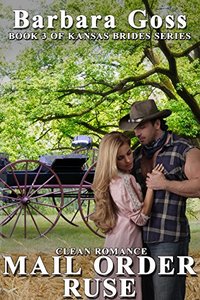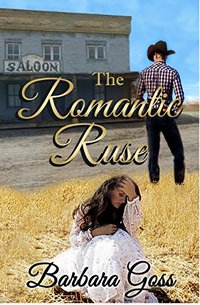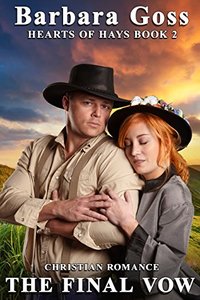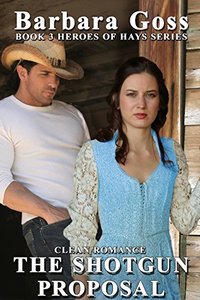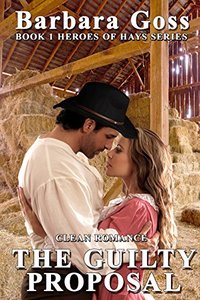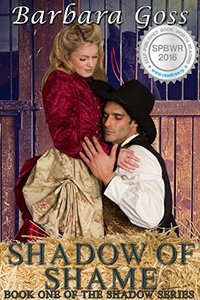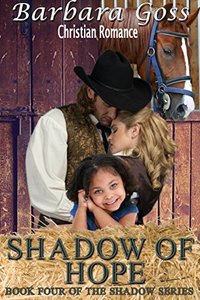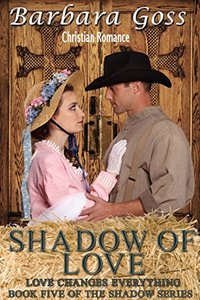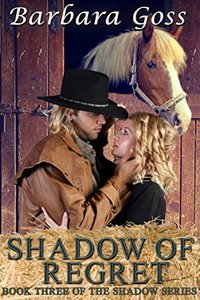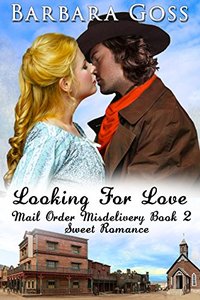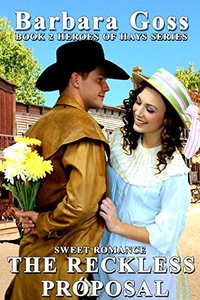Barbara Goss Interview Published on: 28, Feb 2019
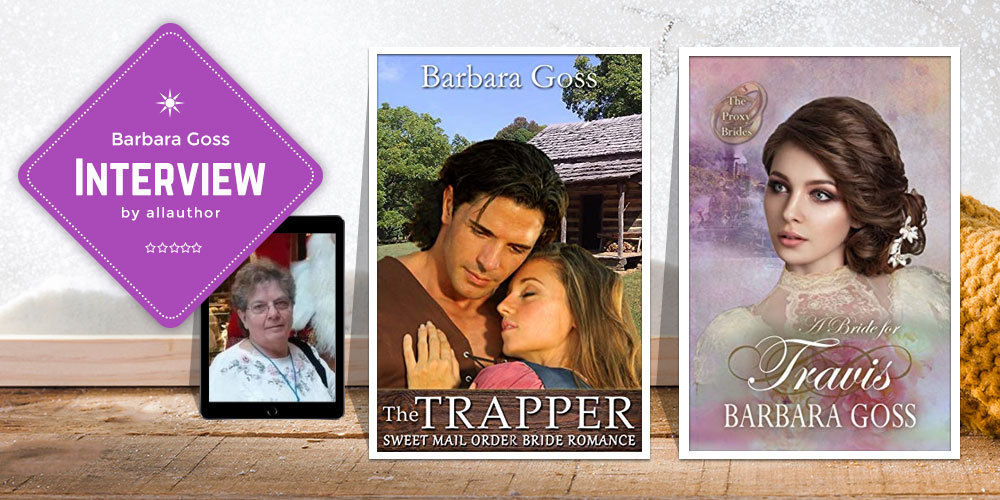 Which book inspired you to begin writing? Who is the most supportive of your writing in your family?
Which book inspired you to begin writing? Who is the most supportive of your writing in your family?
A hundred books by Grace Livingston Hill were my inspiration to write Christian, sweet and wholesome romance books. Not all my books are Christian, some are just sweet and wholesome.
My most supportive person has been my husband, LeRoy, who complains a lot about the time I spend writing, but who also helps me tremendously. I recently had spinal surgery and he converted a recliner into a comfortable desk chair by putting wheels on it and buying me a desk that would accommodate the chair. Now I can type in a reclining position until my back heals.
Which is your favorite place to visit in Western New York? Do you take inspiration for your book setting from the places you have been to?Niagara Falls! It's a mere fifteen miles from our house. We take guests to the area there all the time. I have never visited the places I write about in my books. Research on the Internet is my only source.
Having written 30 Christian/Clean Romance books, what do you think makes a good romance story? Why do you mostly write westerns?I'm now up to forty books! The key to making a good, romantic story is conflict of some sort. I need to create a different conflict for each book.
I've always loved western movies and television programs, and I admire the pioneers who left their cozy homes for the Oregon Trail.
Apart from enjoying crossword puzzles, penny slots, reading, swimming, what else do you do on a Sunday morning? What are the names of your two cats?My husband and I watch a British sitcom called Coronation Street. We tape all the weekly episodes and watch them on Sunday. Because we live so close to Canada we're able to pick the show up through our cable.
I really need to update my bio because Mandy passed away a year ago, but Molly is still with us and my constant writing companion. She sometimes makes writing difficult because her favorite spot in on my lap and it makes typing extremely difficult.
Why do you add a bit of God's word spread within? How do you think your books will help those who read them?One reason is because back in the nineteenth century most of the people were extremely religious. The times were perilous and people relied on God to survive. Church on Sunday was a day to shed the overalls and aprons, and receive a good message as well as much-needed socializing with neighbors. Also, because like me, I think readers need some reinforcement now and then about God, a reminder.
I've received messages from a few readers who said that after reading one of my Shadow series books, they wanted to renew their relationship with God. That's what makes a Christian writer rejoice. Not all my books have strong religious messages, but that series does. Some of my books just have Christian characters who pray during conflict.
What challenges did you face when you began writing in 1988? Did you expect your first book, Forbidden Legacy, to win first prize for fiction at a Christian Writers Convention in Titusville, Florida in 1989?The biggest challenge in 1988 was research. I had to visit the library numerous times, take notes, as well as buy historical books. Now, with the Internet, I pause my writing constantly to Google historical facts. Another challenge was writing a book on a typewriter. Every time I made a change, the whole book or chapter had to be redone and then I had to reprint the manuscript.
I never expected Forbidden Legacy to win or that it would generate a publishing contract. After my manuscript was rejected by all the Christian publishers via mail, I was about to quit writing. Going to the writer's convention was a last-ditch effort. I was surprised when three publishing company editors bid on the book. Through that experience I realized that publishing houses don't read unsolicited manuscripts. The same companies that rejected my book had bid for it.
What was your reaction on winning a book contract with Fleming Revell and later Baker Books? How was your experience of writing four books for them under contract?As you can imagine, I was excited, yet thankful. I knew God has His hands on this. When I became a Christian and marveled at all He'd given me, I asked God, "What can I do for you?" I felt it was writing for Him, but I had doubts when doors didn't seem to open for me. Then, miraculously, it happened.
Fleming Revell gave me only two months to write each book. There were deadlines, and a bit of stress since I worked fulltime, as well. It was burdensome in that I had to mail the manuscript back and forth to them. The company was easy to deal with and I enjoyed a friendship with my editor. I didn’t work with Baker Books, they did the second printings of the books and I had little interaction with them. They bought Fleming Revell.
Why did you decide to work full time as a secretary to the county hospital and the local school system? What motivated you to start writing again?I enjoyed writing, but I needed a steady income as well as a retirement plan. At first, I was able to juggle both working and writing, but as the jobs often became stressful, I stopped writing. However, at the hospital, I wrote and edited the hospital newsletter which earned me an award.
When I retired, I asked for, and received the rights to my four books. The manuscripts were no longer available so I had to convert the hardcover books to digital, which caused some minor problems, which I managed to fix. I, then, uploaded them to Amazon and when they started to sell, it encouraged me to start writing again. I enjoy the freedom as an Indie writer, and don't think I could ever go back to working with a publishing company. When my book is done--it's done, and there isn't any pressure or stress. There is no one to tell me what I can and can't write. Being an Indie writer is the best way to go—at least it is for me.
What is the biggest challenge of turning your eBooks into Audiobooks?My first attempt was a flop. I'd never listened to an audiobook so I had no idea what a good narrator should sound like. The biggest challenge was learning that a narrator doesn't just read the book, but he or she acts it out vocally. Narrating is an art. After joining the audiobook communities, I learned so much, and every subsequent audiobook has been a success. I think the biggest challenge is selecting the right narrator. I take my characters into consideration when selecting a narrator. Are my characters tough? Do any of my characters have an accent? Are there more female or male characters?
What inspired the story of "The Trapper?" What about this book are you most proud of?I wanted a tougher character than most of my previous heroes. I wanted a rugged outdoorsman-type who could also be tender and romantic. I feel I accomplished my mission in that the hero is rugged, has a secret which creates the conflict, but he can be a soft and gentle man when he falls in love.
I'm proud of all my books, but this one is a bit different than the others. I tried something new, and it worked. I don’t consider this my best story, but it ranks up there with the ones that are. The books I’m most proud of are my Shadow Series books.
If you could spend an entire day talking to any of your characters in The Proxy Brides series, who would it be and why? What would you talk about?I love that series. What a romantic notion. Imagine marrying someone you've never seen or met. At first, as you can imagine, things don't go well, but all my books have a happily-ever-after, so eventually, things work out well for them. My favorite character in that series is definitely Allison from A Bride for Nathan. She suffers from anxiety and while I don't know what that feels like, someone very close to me does. He shared with me the feelings he gets when he becomes anxious, as well as his experiences socially and how it makes him feel. My heart went out to Ally, and Nathan was her perfect match since he'd lost his leg in the Civil War and together they worked around their handicaps which drew them closer. If I could talk to Ally, I'd probably talk about anxiety and how Nathan helped her to overcome her fears.
Do you read your book reviews? How do you deal with bad or good ones?That’s a tough question. People don’t realize when they leave reviews that it isn’t an invitation to rant. A review should give a constructive account of the book and whether or not you liked it. Some even rant because the book didn’t download or they say the print was too big or small, and then rate it one star. I deal with poor reviews by visiting the Amazon pages of best sellers, and famous authors. Even they get negative reviews and that makes me feel better. Most of my reviews are from fans who've followed me for years and read every book I write. I cherish those fans.
Being an Amazon best-selling author, what advice would you give to the young writers?Hire a good editor! No one wants to read a book with typos, and grammatical errors since it distracts from the story. Some writers are under the misunderstanding that they can edit their own work. No matter how good a writer is at editing, they cannot edit their own book. The writer, when proofreading their own book, knows what it should say, and they see that and not the mistakes. All writers need an editor. I think of myself as a storyteller and not an author. I depend on my editor to make me an author.
Can you tell us about your current projects? When can the readers expect your next book in print?I have some exciting new projects coming out this spring. I'm a part of two new multi-author series with some top writers. The first is a wagon train series called the Prairie Roses Collection. All the books in this series are titled with the heroine's name. My contribution to the series is a book called Hope, which follows Hope's life through the Oregon Trail and beyond. This book will be released on Amazon on April 4th. In May, my release is with the Lockets and Lace series. This will be round two of this successful series with a multitude of impressive authors. My book for this series is titled, The Secret Diary. The heroine in this story is an orphan who finds her mother's diary in an old trunk and it changes her life.
As for books in print, I only converted one book of my 40 into print, and it wasn't worth the effort. Since I sell only on Amazon, most of my sales are for the eBooks. Print books are worth the effort if you’re an author who makes public appearances, book signings and the like, which I don't do. Maybe someday...
What is the most difficult part of your artistic process? How has been your experience working with AllAuthor?The most difficult part of the writing process is coming up with unique storylines. After writing 40 books, it's difficult to come up with a new, fresh story. I don't want to produce same old, same old. So, to me, this is the most difficult part of being an author. I love being a member of AllAuthor. Every successful author needs a place to learn and improve. I especially love the services pages of AllAuthor. I still haven’t navigated the full site yet. There is so much to see and learn.
Share Barbara Goss's interview
A hundred books by Grace Livingston Hill were the inspiration for Barbara Goss to write Christian, sweet and wholesome romance books. According to her, the key to making a good, romantic story is a conflict of some sort. She has always loved western movies and television programs, and she admires the pioneers who left their cozy homes for the Oregon Trail. The biggest challenge in 1988 was research. The most difficult part of the writing process is coming up with unique storylines. The author has some exciting new projects coming out this spring.
Barbara Goss Interview Published on: 10, Feb 2018
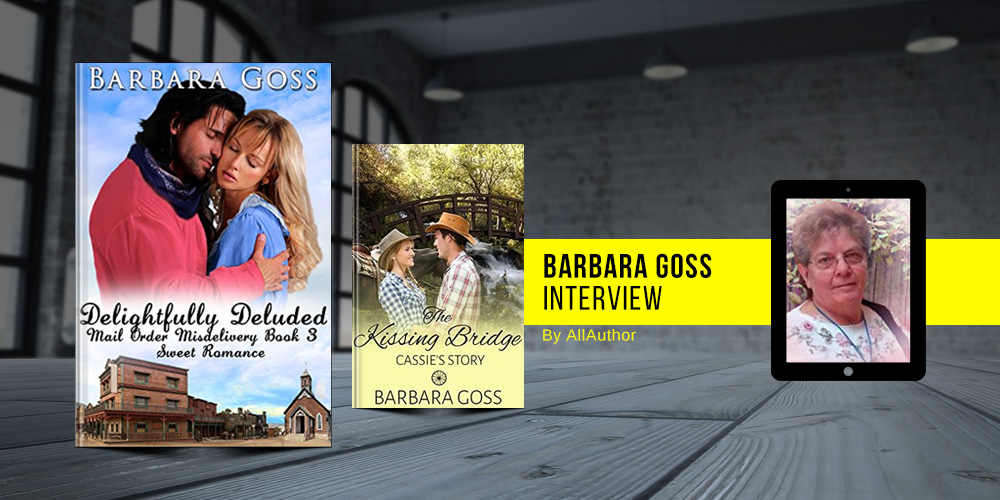 Tell us a bit about your background and childhood life. What were some books or authors that you loved reading as a child?
Tell us a bit about your background and childhood life. What were some books or authors that you loved reading as a child?
I was daughter #3 of 4 and grew up in a small city between Buffalo NY and Niagara Falls NY. My father was a local celebrity as a wrestler and referee of wrestling and then as a legislator.I loved and read books constantly as a child from age 10 to present. My grandmother bought me books from her church rummage sales like: The Bobbsey Twins, Bambi, and Robert Louis Stevenson’s A Child’s Garden of Verses. I knew every poem by heart.
Was there a defining moment in your life where you were suddenly hit with the desire to be an author or has it always been a kind of innate sense of purpose?I loved books so much and thought the authors were magical and never imagined I would ever be one. I became a Christian and turned from lurid romance books to read books by the first Christian writer: Grace Livingston Hill. I read all 100 of her books. When I ran out of her books to read, I felt the world needed more Christian writers. My then there were just one or two. So I decided to try my hand at it.
What is one stereotype or misgiving that a lot of people have about Christian romance and how would you like to change that?I can’t speak for every author of Christian romance, but I try to convey through character behavior God’s messages without preaching. I add romance and adventure to enhance the read. Some people think Christian romance must be boring without hot romance and a lot of preaching. A good writer can give you romance, tension, and adventure. The Shadow Series is my most spiritual of all my books; some are mildly spiritual with religion and God just present in the books without over powering it.
What was the first part-time job you ever held and what was the experience like?I worked at a local hospital serving patients their meals. I worked every day after school to serve the dinner meal and 12 hrs on Saturday and Sunday to serve all three meals. Our crew also washed the dishes and setup for the next meal.
What are the differences in the theme between the Heroes of Hays and Hearts of Hays series'?Heroes of Hays is mostly the hero’s story and Hearts of Hays mainly the female’s story, but they all take place in Hays, Kansas.
What is your longest running book series? What is it about this series that really resonates with you?The Shadow Series is the most inspirational and longest running and best selling. Each book deals with problems that people experienced then and we still experience today: Guilt, Deceit, Forgiveness, and Love for our fellowman despite differences in looks and lifestyle.
Which book in The Shadow Series was the most fun to write for you? Who is your favourite character across the entire series and what makes them so special?I love them all but I think Shadow of Regret is my favorite. I introduced a character named Dora that my readers loved and my heroine Rose was a sweet but mischievous little minx. I can relate to Rose.
How did you come up with the idea for "Temptation by Moonlight"? Why did you choose to set the book during the 1900s?I do genealogy, and my father was born in Pittsburgh and my mother in Uniontown, Pennsylvania. I’ve done extensive research in those areas and that era. I wanted to do just one semi-modern book about a crippled man and his aide/companion. I often mention Uniontown in my books. I have so many ancestors from that area.
Do you prefer creating stories and characters based on real life or make it all up as you go along? Is "Stolen Heritage" based on any true event?My characters are all made up, but every so often I take a few characteristics from some character from a movie or soap opera so I’d know exactly how they’d react in certain situations. Stolen Heritage is not based on any true event, but I’ve always loved Native Americans and have incorporated them in my early books.
Why do you think people read and why is literature so important for any developing society?Different genres serve people in different ways. Self-help books help to improve one’s self, non-fiction is educational, and fictional books allow the reader to escape to a wonderful place for a short time. I always used my fictional books as an escape from the stress of the world.
Which of your books was the first bestseller and how did you celebrate the good news?It’s a toss up between Shadow of Shame and Mail Order Mishap. Ironically, Mail Order Mishap was the most controversial book; some loved it, and a handful hated it because of one secondary character whose lifestyle isn’t accepted by many Christians.However, these same people don’t mind murderers, bank robbers, or any other villains in Christian books. I was surprised and disappointed, yet it was my best seller. I celebrate by posting my book’s ratings on my fan group, Sweet Wild West Reads.
If someone gave you $100 million to quit writing, would you accept it or not?I might. After writing 32 books I’m struggling to come up with new and fresh ideas. I don’t want to write “cookie cutter” books.
On days when you really don't feel the creative juices flowing, what do you do to get motivated again?I listen to country western music, the classics like Conway Twitty, George Jones, Merle Haggard and Ray Price.
Share Barbara Goss's interview
Author Barbara Goss was daughter #3 of 4 and grew up in a small city between Buffalo NY and Niagara Falls NY. She loved and read books constantly even as a child and her grandmother often bought her books from church rummage sales. The first Christian writer whose books she ever read was Grace Livingston Hill, which inspired her to write her own. Her main goal as an author is to convey God's message through character behavior and with elements of romance and adventure without sounding preachy. The Shadow Series is her most inspirational and longest-running and best-selling series. Barbara believes that different genres serve people in different ways and she herself has always used her fictional books as an escape from the stress of the world.
